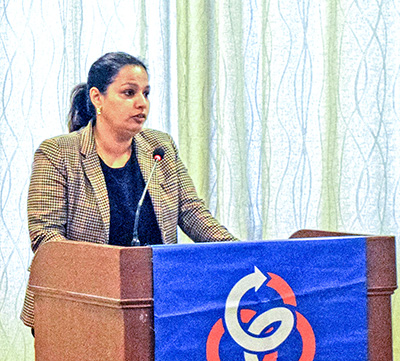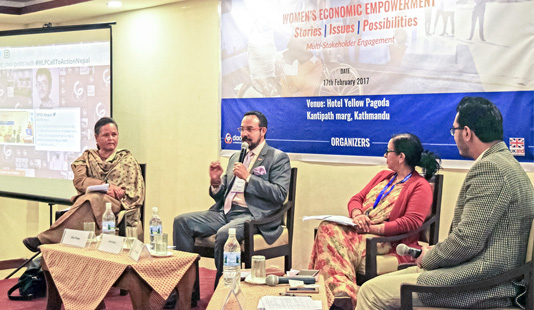Global Report of the Secretary-General’s High-Level Panel on Women’s Economic Empowerment (HLPWEE) and its implications to Nepal
Date:
Remarks by Ms. Gitanjali Singh, UN Women Nepal Deputy Representative at Hotel Yellow Pagoda, Kathmandu, Nepal.
[solutation]

On behalf of UN Women, I am very pleased to be at this multi-stakeholder engagement focusing on women’s economic empowerment.
Gender equality is a matter of human rights. Yet it remains the greatest human rights challenge of our time. Women’s economic empowerment can generate huge gains for human development, economic growth and business. Yet the pace of improvement in expanding women’s economic empowerment and closing gender gaps has been far too slow.
The statistics speak for themselves – globally, one in two women aged 15 and over is in paid employment compared with about three in four men. At the same time, women take on about three times more unpaid work than men.
The independent High-Level Panel on Women’s Economic Empowerment was established by the former UN Secretary-General in March 2016. The panel was co-led by the Costa Rican President and the CEO of IKEA Switzerland. The panel was backed by the United Kingdom, the World Bank Group and UN Women. The objective of the Panel was to provide thought leadership and mobilize concrete actions aimed at closing economic gender gaps that persist around the world. It is an attempt to ensure the 2030 Agenda moves from the pages of UN documents into the lives of women and builds stronger, more inclusive economies, aiming at placing women’s economic empowerment at the top of the global development agenda.
The high level panel report identifies seven drivers of change and highlights concrete actions and interventions that are proven or promising.
The first driver is changing adverse norms and promoting positive role models to fight against stereotypes. Social norms and cultural practices often define and bind, people’s attitudes, behaviours and thinking around gender roles, and gender violence and discrimination. The perceptions of people, communities and even women themselves toward the type of work done by women, the mobility of women outside of their home, the value of women’s work linking to unpaid work and unequal remunerations, respect earned at work and equal access to property are all influenced by such social norms. In Nepal, like many other countries, women’s mobility, a fundamental human right, has been restricted. Transformation of such social norms and practices is crucial and should be at the top of our agenda for inclusive and sustainable development.
The second driver is ensuring legal protection and reforming discriminatory laws and regulations to create a level playing field as well as necessary social protection for women for women to enhance their participation in economic activities. Gender responsive laws and regulatory frameworks are essential to guarantee women equal opportunities and protections and remove structural barriers. The Constitution of Nepal in its preamble refers to economic equality and includes several progressive gender equality provisions. The Government has been working on the development, amendment and revisions of several laws and policies, including the amendment of the Foreign Employment Act, to incorporate specific provisions to further women’s economic empowerment. The National Information Commission recently brought out a publication Women’s Entitlements” in six different languages which popularizes 29 entitlements of women that are provided under different policy documents. Going forward, however, we must address the implementation deficit. The laws that exist on paper must translate into changes in women’s lives. We need to shift from formal to substantive equality.
The third driver focuses on recognizing, reducing and redistributing unpaid work and care. The High-Level Panel’s report emphasizes that addressing challenges around care requires recognizing the importance of care and valuing this work. Investing in infrastructure and labour-saving technologies can indirectly contribute to addressing the issues around care work as they can reduce the time spent on care. In Nepal, women on average spend 268 minutes per day in housework (includes cooking, cleaning, washing, shopping) in comparison to 56 minutes per day by men. After the earthquake, the Common Feedback Project partnered with UNFPA and UN Women to carry out targeted perception surveys which highlighted 68 per ccent of women reported a decrease in time spent on paid work and 72 per cent of women reported a decrease in time spent sleeping and resting. Working to change social norms and practices around the gender division of labour is an urgent task. Redistribution of care work should be discussed beyond the boundary of the family, as the government has a crucial role to play to provide support to caregivers through social protection schemes.
Building assets for women’s economic empowerment and participation is the fourth driver. Globally, discussions have focused on digital inclusion and closing the digital gender gap. Digital technologies will help us come up with innovative solutions which can facilitate and further promote women’s access to finance and property. However, in the context of Nepal, this driver is more meaningful when discussed from the perspective of women’s access to and control over land, property and other productive assets. In Nepal, only about 19 per cent of the total households have registered land and property under women’s names. This is a result of improvements after the Government included gender responsive provisions in several laws and policies to increase women’s access to land and property. Ensuring women’s right to information (RTI) is the first step towards this goal.
Fifth, changing business culture and practice so that more economic opportunities can be created for women in the private sector. The achievement of inclusive and sustainable development is only possible with the power of partnership, and the private sector is an integral contributor to development. Fair and unbiased recruitment and promotion, equal pay for the same work done by men and women, and decent working conditions and environment for all workers (men, women, people with disabilities, LGBTI), are all critical for equality and inclusion at the workplace. Family-friendly policies such as maternity and paternity leave, support for child and elderly care, zero tolerance of any form of harassment, exploitation and abuse, appropriate training and mentoring for women to develop job skills are some of the suggestions.
In order to facilitate the process, UN Women and the United Nations Global Compact launched the Women’s Empowerment Principles (WEPs) in March 2010 with a number of major global companies to empower women in the workplace, marketplace and community. As of 2016, more than 1,400 business leaders around the world have demonstrated leadership on gender equality through the WEPs. I am happy to highlight that four private sector companies in Nepal have been signatories of the WEPs since 2015 and are exercising their commitment to empower women.
The sixth driver focuses on improving public sector practices in employment and procurement. Contributions to change are expected not only from the private sector but also from the public sector. Globally, governments are major employers and procurers of goods and services. The power of the governments in setting high standards for and exemplifying gender equality at work cannot be underestimated. In Nepal, TEWA, Village Café and Chhari are successful facilities managed by women that must be promoted and used.
Seventh and lastly, strengthening women’s visibility, collective voice and representation, especially of the most vulnerable and excluded, to participate in and contribute to economic activities is critical to driving women’s economic opportunities. Greater female participation and leadership has sharpened the focus on gender issues in trade unions.The Federation of Women Entrepreneurs’ Association Nepal some years ago had put together an agenda for the economic empowerment of women through entrepreneurship. Nepal has a strong and vibrant women’s movement. Women’s organisations and collective enterprise can benefit from access to finance, business and leadership skills and technical advice and assistance, such as how to link markets and supply chains. Boys and men need to be partners in this change process.
During today’s consultation, we will be able to review, discuss and validate findings from district-level consultations. Women’s economic empowerment can ONLY be realized intentionally. It requires political will as well as the power of partnerships among all actors to achieve scalable and sustainable impact.
We look forward to working with you to take this important issue forward because investing in gender equality and women’s economic empowerment is both the right thing to do and also the smart thing to do.

- Ensuring gender equality is one of the greatest human rights challenges of our time, Ms. Gitanjali Singh @unwomenasia #wee #daayitwa pic.twitter.com/cLr4otaJoe
— Norway in Nepal (@NorwayinNepal) 17 กุมภาพันธ์ 2560